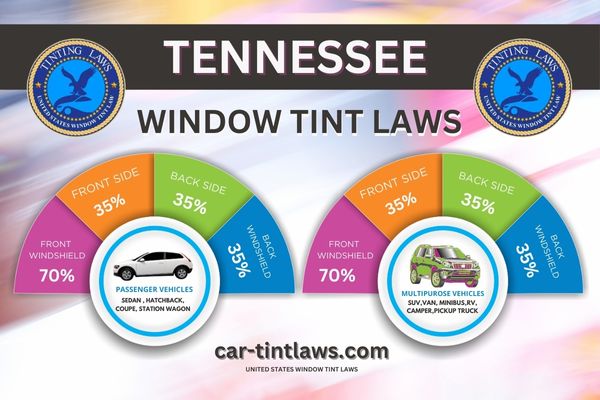If you’re considering tinting your car windows in Tennessee, it’s important to understand the specific regulations to avoid any legal issues.
Tennessee’s window tinting laws mandate that front and back side windows, as well as rear windows, must allow more than 35% light transmission.
While metallic elements are permitted for reducing glare, reflective tinting on windshields is strictly prohibited.
It’s also essential to note that each tinted window must display a compliance sticker, and manufacturers need to certify the tint film.
Curious about medical exemptions or the penalties for non-compliance? Let’s explore those next.
Window Tint Darkness in Tennessee
When discussing window tint darkness in Tennessee, it’s important to know the specific regulations for different types of vehicles.
For sedans, front, back side windows, and rear windows must allow more than 35% light transmission.
The same rule applies to SUVs and vans, ensuring consistency across various vehicle types.
Tint darkness for sedans:
- Windshield: Must allow more than 70% of light in; any darkness on AS-1 line.
- Front Side windows: Must allow more than 35% of light in.
- Back Side windows: Must allow more than 35% of light in.
- Rear Window: Must allow more than 35% of light in.
Tint darkness for SUV and Vans:
- Windshield: Must allow more than 70% of light in; any darkness on AS-1 line.
- Front Side windows: Must allow more than 35% of light in.
- Back Side windows: Must allow more than 35% of light in.
- Rear window: Must allow more than 35% of light in.
Window Tint Reflection in Tennessee
In Tennessee, you’re allowed to use tinted windows with metallic elements to reduce glare, but there are no specific regulations on tint reflection for front and back side windows for both sedans and SUVs or vans.
However, it should be emphasized that reflective tinting on windshields is not allowed. This flexibility extends to the choice of tint colors as the state does not ban any specific colors.
Tint reflection for sedans:
- Front Side windows: Reflective or metallic tints are prohibited for sedans in Tennessee to reduce glare and distractions for other drivers.
- Back Side windows: Tennessee law restricts sedans from using reflective or metallic tints to enhance visibility and maintain a clear line of sight for all drivers.
Tint reflection for SUV and vans:
- Front Side windows: Reflective or metallic tints aren’t allowed on SUVs and vans in Tennessee.
- Back Side windows: Reflective or metallic tints aren’t allowed on SUVs and vans in Tennessee.
Other Tennessee window tint rules and regulations
- Side Mirrors: No restrictions.
- Restricted Colors: In Tennessee, all tint colors are permitted.
- Certificates: Manufacturers of film need to certify the film they sell in the state. Ask your dealer if they are using certified film.
- Stickers: The sticker/label of compliance to identify legal tinting is required between the film & glass on each tinted window.
- Medical Exceptions: Tennessee permits medical exemptions for special tint. For more details about the specific terms of the exemption, consult TN state law.
- Penalties: Violating window tint laws in Tennessee can result in fines. Make sure your vehicle’s tint complies with state requirements to avoid penalties.

Medical Exemptions for Window Tint Rules in Tennessee
For those with medical conditions impacted by UV light, you can apply for exemptions from Tennessee’s window tint rules.
To begin the process, you’ll need to secure a physician certification that confirms your medical condition.
This certification is an essential step, as it validates the necessity of the exemption.
Once you have your physician’s certification, your exemption request will be reviewed by a medical review board.
This board carefully evaluates each application to confirm that the condition warrants an exemption.
If the board approves your request, the Commissioner will issue a certificate indicating the level of exemption granted.
This certificate serves as official documentation that you’re allowed to have window tint levels exceeding the standard legal limits.
If you’re dissatisfied with the decision made regarding your exemption request, there’s an appeals process available.
This guarantees that you have the opportunity to present additional information or clarification about your medical condition.
By following these steps, you can make sure that your needs are met while complying with Tennessee’s window tint regulations.
This process helps maintain a balance between public safety and individual health needs, fostering a sense of belonging within the community.
Tennessee Window Tint Ticket Cost
After understanding medical exemptions, it’s vital to be aware of the potential costs and consequences associated with violating Tennessee window tint laws.
The Tennessee window tint ticket cost can range from $10 to $50 for violations.
Law enforcement officers have the authority to issue tickets for non-compliant window tints, so it’s vital to verify your vehicle adheres to the legal standards.
Violations of Tennessee window tint laws can not only result in fines but also potential legal consequences.
The ticket costs vary depending on the severity of the offense, and repeat violations may lead to higher fines.
It’s crucial to stay informed about these regulations to avoid unnecessary expenses and complications.
Tennessee DMV Contact Information
To get accurate information on Tennessee’s window tinting laws, you’ll need to contact the Tennessee DMV.
They can provide specifics on office locations, contact numbers, and operating hours.
For detailed guidelines, you can also reach out to the Tennessee Department of Revenue’s Vehicle Services Division at (615) 741-3101.
Office Locations
If you need to handle driver’s license, registration, or titling services, Tennessee DMV office locations are conveniently available throughout the state.
Whether you’re in Nashville, Memphis, Knoxville, Chattanooga, or Johnson City, there’s a DMV office ready to assist you.
These offices can provide crucial information on vehicle inspections, tags, titles, and driver’s license renewals.
Knowing Tennessees window tint laws is essential, and understanding the details can help guarantee your vehicle remains compliant.
For those who prefer professional services, Protint Window Tinting is a reputable option.
They can help you adhere to Tennessee’s window tint regulations, ensuring your vehicle meets the legal requirements while maintaining a sleek appearance.
When planning your visit to a DMV office, make sure to check their addresses and hours of operation online.
The Tennessee DMV website offers a convenient way to find the nearest office location and access online services.
This resource is invaluable for scheduling appointments and avoiding lengthy wait times.
Contact Numbers
For quick and accurate information on Tennessee’s window tinting laws, you can contact several key departments directly.
Your primary contact for vehicle registration, title, and window tinting laws is the Tennessee Department of Revenue at (615) 741-3101.
They can provide detailed information and guidance on how to stay compliant with state regulations.
The Tennessee Department of Safety and Homeland Security is another valuable resource.
They enforce vehicle regulations, including window tinting laws, and can be reached at (615) 251-5166 for any specific questions or concerns.
If you prefer a more local approach, visiting your nearest Local DMV Offices can also be helpful.
The staff there can offer specific information on window tinting regulations in Tennessee and assist with any paperwork or compliance checks you might need.
The Tennessee Highway Patrol also plays an essential role in enforcing traffic laws, including window tinting regulations on state roads.
You can contact them at (615) 741-2060 for enforcement-related inquiries.
For the most up-to-date information on window tinting laws, consult official Tennessee state websites or resources.
These online platforms are regularly updated to reflect any changes in the law and provide detailed guidelines.
Operating Hours
The Tennessee DMV typically operates Monday through Friday from 8:00 AM to 4:30 PM, providing ample time for you to complete essential tasks.
These operating hours guarantee you have sufficient time to manage services such as vehicle registration, driver’s license renewals, and titling.
However, it’s always a good idea to double-check for any holiday closures or special operating hours, as these can vary by location.
Some DMV locations in Tennessee may offer extended hours on certain days, making it even more convenient to visit.
Additionally, the Tennessee DMV offers online services 24/7, allowing you to complete many tasks without needing to visit in person.
This can be particularly useful for those with busy schedules or for handling simple renewals and registrations.
For the most accurate and up-to-date operating hours, you should visit the official Tennessee DMV website.
The site provides contact information for specific DMV locations, ensuring you know precisely when and where to go.
By planning ahead and checking online, you can avoid unnecessary trips and make the most of the available services.
This way, the Tennessee DMV can effectively meet your needs for vehicle registration and driver’s license renewals.
References
Tennessee law Title 55 Chapter 9 Part 1 (search for “windows with tinting”)
Frequently Asked Questions
What Is the Darkest Legal Tint in Tn?
The darkest legal tint percentage in TN is 35% VLT for all vehicle types’ front side, back side, and rear windows.
It balances UV protection, heat reduction, and privacy concerns, ensuring you belong on the road safely.
Do Tennessee Cops Care About Tint?
Did you know 30% of traffic stops involve window tint issues? Enforcement levels vary as police use discretion.
Common violations can lead to ticket consequences. Community attitudes show mixed feelings, but staying compliant is wise.
How Do I Get a Window Tint Exemption in Tennessee?
To get a window tint exemption in Tennessee, you’ll need physician certification for your medical condition.
Complete the application process, submit legal documentation, and await approval.
Confirm compliance with state inspection, understand renewal restrictions, and keep updated.
What Is the Darkest Legal Tint?
The darkest legal tint is 35% VLT for all vehicle windows. Tint enforcement is strict, with fines for exceeding limitations.
Tint visibility guarantees safety, but you can seek tint exemptions for medical conditions. Stay updated on tint regulations.
Conclusion
Grasping Tennessee’s window tinting laws is essential for compliance and avoiding fines.
You need to make sure your tint allows more than 35% light transmission, steer clear of reflective tints on windshields, and display compliance stickers.
Medical exemptions are available if needed. By following these regulations, you can drive with peace of mind, knowing your vehicle meets state standards. For additional information or questions, reach out to the Tennessee DMV or consult official tint law resources.
